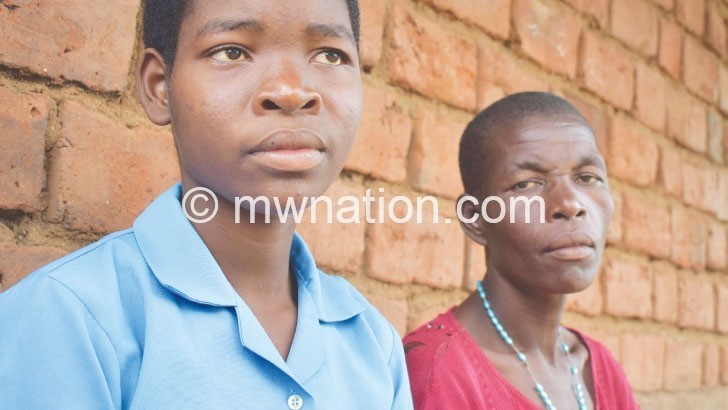Janet’s second chance
When Janet Samuel was selected to Golomoti Community Day Secondary School in Dedza District, her parents could not afford tuition fees. Her uncle Joseph Banda, who believes every child must learn, convinced the head teacher to enrol the girl while he searched for money.
Thrilled by Banda’s urgency to keep the girl in school, the teacher allowed the 17-year-old to learn for a term and listed her among learners most in need of bursaries.
Janet’s wish was granted when Unicef rolled out bursaries and mentorship programme for vulnerable children at her school.
Bizarrely, that’s when the girl, from Kanjovu Village in Traditional Authority Kachindamoto on the eastern side of Dedza, did what many never imagined could be her idea of “breaking free”.

At 16, she fled her parents’ home in the night to marry a school dropout two years her senior.
“My uncle repeatedly told me to stop dating the boy. I found it irritating. One night in November 2019, I sneaked into my man’s home. This further angered my parents,” she narrates.
Too young to marry
However, Janet regrets marrying young—a common form of violence against children even though the Constitution of Malawi outlaws marriages involving boys and girls aged below 18.
“There was no honeymoon for me,” she recalls. “The next morning, while my agemates were going to school, I joined my husband to do piecework in neighbouring crop fields where we earned just K5 000 for tilling a plot the size of a football field.”
After four weeks in marriage, Janet concurred with her uncle that marriage isn’t meant for children.
“Beside the hard labour, we often went to bed hungry. Every time I asked why we were starving, my husband would shout at me like a worthless parasite, saying I imposed myself on him,” she says.
Janet called it quits when her uncle and child protection officer Montfort Kafatiya met her husband to discuss the ills of child marriage and the importance of education.
She vows never to marry again until her dream to become a nurse comes true.
Banda, 30, states: “I was touched because my niece was—and still is—too young to marry. She needs to go to school.”
He thanks the child protection officer for swiftly following up and terminating the marriage.
“Keeping girls in school helps break the chain of poverty haunting several generations in my clan,” Banda says.
And Kafatiya reminisced about the crunch talks with Janet’s teen husband.
“I discovered Janet had dropped out when I visited her school to assess the performance of learners on Unicef bursary and mentorship programme. So, we quickly intervened. Her husband didn’t resist our demands to release her. I’m happy she is back to school,” he says.
Janet offers adolescent girls at her school pep talk about dangers of child marriages.
She feels lucky that medical tests conducted at Golomoti Health Centre confirmed that she left wedlock without a pregnancy and sexually transmitted infections.
Rapid response
The swift community-based response personifies great strides towards improving the quality of care and support for children experiencing violence, including child marriages.
Since 2012, Unicef is supporting the Government of Malawi, through the Ministry of Gender, Children, Disability, and Social Welfare, to prevent rights violations and assist child survivors of violence.
The initiative has strengthened child protection in Dedza and nine other districts, improving the detection and handling of child marriages prohibited by the constitutional amendment of 2017.
Although Parliament increased the legal marriageable age from 15 to 18, the Malawi Demographic and Health Survey shows that one in every two women married before her 18th birthday.
The Unicef-funded initiative seeks to roll back the problem and link children to the services they require, set standards and provide a step-by-step guide on how to handle cases of vulnerable children and those being subjected to violence, abuse, exploitation and neglect.
“It is painful that many people in the country don’t seem to understand the implication of the law against child marriages. We cannot continue to blame culture, poverty and parental indifference. We need to end child marriage because it forces girls to drop out of school, bear deadly complications of childbearing and remain in poverty,” says Jessie Kazembe, child protection officer at Unicef.
Kazembe commends community child protection agents for swiftly resolving cases to safeguard the rights, well-being and aspirations of children.
“Child marriage is a huge problem. Child protection workers are doing a great job in curbing the practice in their communities. Without their intervention in Janet’s case, she would have missed an opportunity to learn and become a nurse as she desires,” she says.
Ensuring girls learn
Janet’s mother, Amina Gilato, asks government to strictly enforce child protection laws and policies.
“Children should be in school, not in marriage,” she says.” I was devastated to see my fifth-born going into marriage aged 16. Her future was doomed. But this will continue to claim lives and futures of girls unless government enforces laws it makes,” says the mother-of-eight.
And Janet sounds determined to scale dizzying heights.
She states: “I thank everyone who helped bring me back to school. They gave me the best gift, a second chance.
“Child marriage puts futures of girls and boys under threat. In my class, I have so far mentored two girls to desist from marrying young as was my case.”





